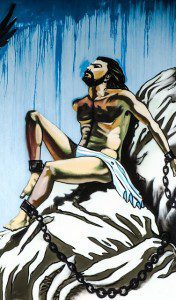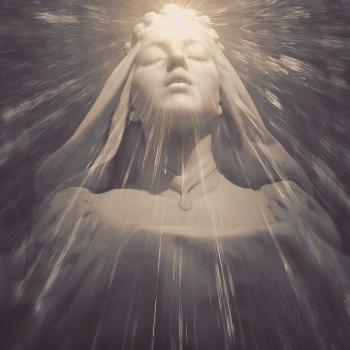As a small child, I was fascinated by the story of Prometheus, the rebel, the half-Titan, half-Oceanid of ancient Greek mythology, who defies the god-king Zeus, by stealing fire for humankind. What a courageous, awesome thing to do! I told my child-self. Prometheus feels compassion for the plight of the humans he beholds, living cold and wet in their damp, stony hovels. I didn’t know it at the time, but Prometheus bears the imprint of the spark that creates the “spiritual seeker,” one who is willing to risk everything, one who is moving away from service to oneself in order to be in service to others. I think that we can look at the path of Prometheus as the archetypal path of each of us as spiritual seekers, from our initial realization to ultimate alignment with Self, both Divine and human. It is the destiny of the spiritual seeker to ultimately find his/her way to the Garden of Gethsemane. Walk with me “in the footsteps of the Fire Thief.”
Stepping outside the expected ‘box”
Prometheus is moved by empathy for the wretched state of mankind. He is a “lover” of mankind. He is the son of a Titan – the parents of the gods of Olympus – and need not attend to or even notice those less fortunate, yet he is moved by those less fortunate. He uses his “gifts” – his intellect, his cleverness, and his knowledge of “human” nature (for indeed the gods of Olympus are “human-like,” but more powerful, demanding and erratic) – to outmaneuver Zeus for the benefit of mankind. Prometheus finds himself now standing apart from others of his “god-tribe.”
“Unsavory” methods
Prometheus plays a dangerous game. He uses his “gifts” to outwit Zeus, casting doubt on Zeus’ wisdom and power. Prometheus famously tricks Zeus at Mecone into designating the inedible parts and bones of the bull for sacrifice, by disguising these undesirable parts with appealing, glistening fat. Zeus does not see beyond the exterior appearance. Nor does Zeus detect the desirable beef hidden within an ox’s stomach. Prometheus, thereby, saves the more nutritious parts for human consumption. He steals fire from Mt. Olympus by smuggling the smouldering flame in a giant fennel-stalk. And for his great offense against the gods, he is punished. But, Prometheus feels no fear.
“Poor” Prometheus – he really had no choice
Once Prometheus awakened to the plight of the humans, once he truly “saw” them, he could not turn away. Built into each of us is a longing for we know not what. Each of us experiences an emptiness which we desperately desire to fill. Prometheus’ life as one of the gods was unfulfilling and without meaning. Each of us has a longing for love and connection which we first become aware of in our relationships with other humans and animals. This love and connection feels like “home,” but often in a limited, conditional sense. These relationships are pointing the way to the Source of unconditional love, to God herself.
Thinking we can have it both ways
Why did Prometheus trick Zeus? Why not just challenge him openly? I think as the spiritual journey begins, we enthusiastically tell ourselves that we will follow this new path, but at the same time continue with “business as usual” on some level, misunderstanding the nature of the spiritual journey. The nature of the journey is that it be unlimited and undefined and that we surrender to it. It is impossible to guess the movement of Spirit. We are just wasting our time trying to do so. Thinking we can do things without being “seen” – one foot in and one foot out, so to speak – is madness. Thinking we can have it both ways – believing it won’t really “change” everything – is madness. Life is an integrated whole – anything has the possibility of changing everything.
What was the crime, anyway?
But, what exactly has Prometheus done that is so wrong? He has pulled back the veil and revealed the inadequacy of the gods. The “gods” resist his efforts on the behalf of humanity, lest humanity become powerful like them. The fire he steals attends to more than humans’ mortal needs. The fire allows them both physically and psychologically to awaken to their immortal, spiritual identity. Fire is the source of their inspiration, ingenuity and creativity, their art and their science.
Who are these “gods”? Who created these “gods?” This is the power of the great mythologies, man’s early creation of deities across all cultures to understand the world in which he/she lives. These deities run the full spectrum from erratic, controlling “super humans” to the multi-faceted, sublime face and expression of the Divine. And, all along the way, as our awareness and commitment deepens, we recognize that every way in which we attempt to define God, is a false path, in service to us for only a short time. We work our way little by little out of everything we ever thought about God, everything we were told about God, until we live in the experience of God, for which we have no words.
The punishment
Zeus sends Strength and Force to chain Prometheus to a rock on the highest peak in the Caucasus Mountains for all eternity. He sends his eagle daily to eat Prometheus’ liver. Because Prometheus is immortal, his liver is re-generated each night, only to experience another day of pain and agony. According to the Roman poet Horace, the liver is both the source of the emotional, passionate life and the seat of intelligence, terms we have come to think of as contradictory, or at least uncomfortably co-existent in the modern psyche. If the liver is indeed the body’s natural filter for food and anything else that is circulating in the body due to our emotional, intellectual, psychological and spiritual experiences, there is no mistaking why the eagle seeks the liver. The eagle is attacking Prometheus’ essence, not just one of his vital organs. The path of the seeker is the search for and recognition of one’s true spiritual identity, one’s divine essence.
The Final Reckoning – chained to the rock, prayer in the garden
So, can we expect “punishment” for stepping “outside the box?” Maybe “punishment” isn’t the right word. Maybe the word is opportunity – the opportunity to continually face our challenges, until we get them right? Prometheus had ten generations to think things over, until he was rescued by Heracles, a descendant of Io, to whom Prometheus had shown compassion. He must have wondered over the generations, if anything would ever come of that.
Or, did he? Was his time chained to the rock a gradual purification of Prometheus, as all false facades dropped away, to reveal his true Self. Did the nature of his “liver” change, as his body and his experiences changed? If so, what does the “eagle” – those we encounter on our path – experience through us day by day? As spiritual seekers, we, too, must rid ourselves of “false positives,” all those things we cling to, that define us, that circumscribe our immortality, our divinity, the “I am this . . . I am that” statements.
In the Garden of Gethsemane at the foot of the Mount of Olives, Jesus implores God to “. . . let this cup pass from me.” His humanity is stepping back from the horrific suffering to come. His friends have fallen asleep. He is alone. The path of the spiritual seeker is a singular, lonely path, though we may walk with others for a time. At the rock or in the garden, it seems at first that we are alone. Jesus returns to prayer saying, “My father, if this cannot pass until I drink it, your will be done.” Jesus’ final surrender and acceptance allows him to feel and know the presence of God. Jesus is stripped of anything that is still un-godlike within him, refining his love, and revealing the essence of his spiritual identity.
Conclusion
What, then, is the Promethean challenge? I would say it is to take the “bait” of that initial realization, to embark on the spiritual path, to not give up even when we can’t see our way, to see it through to the end, to know that we will be given opportunities, sometimes painful, to shed that which no longer serves us, and that we will ultimately arrive at that destination which we so humbly seek. There is always a part of us, deep within, seeking God, a tiny spark of Divinity seeking union with the divine Source.













